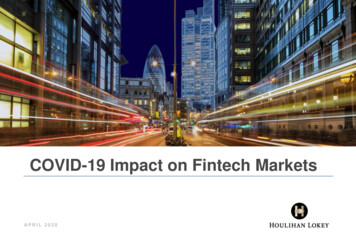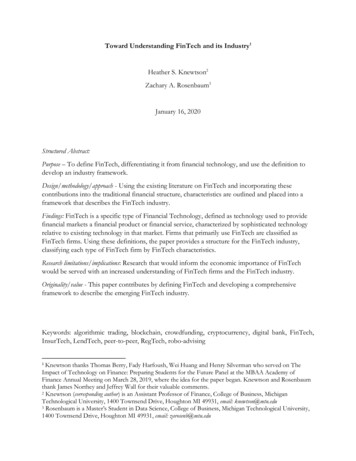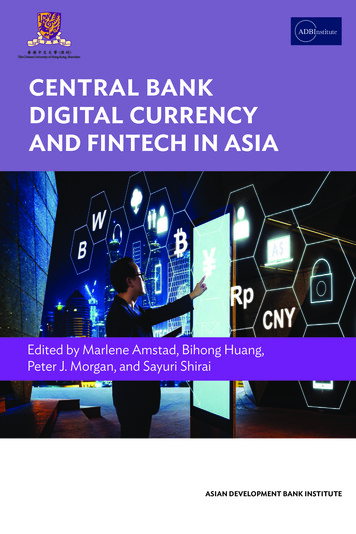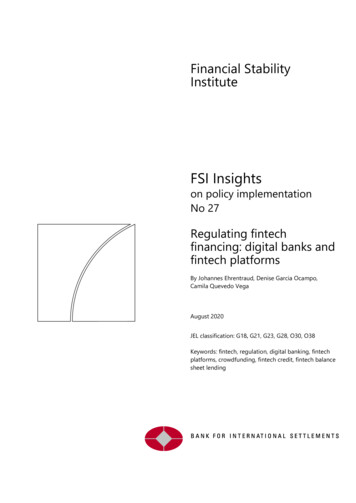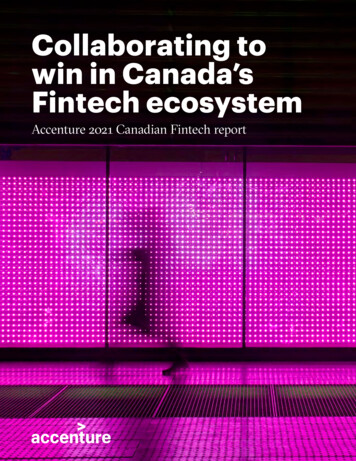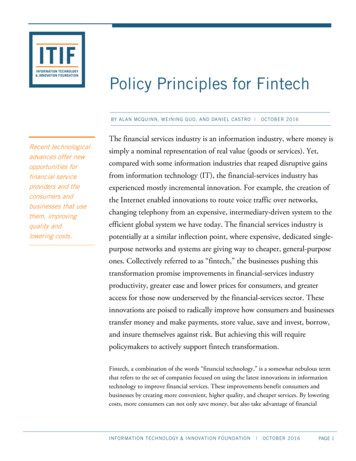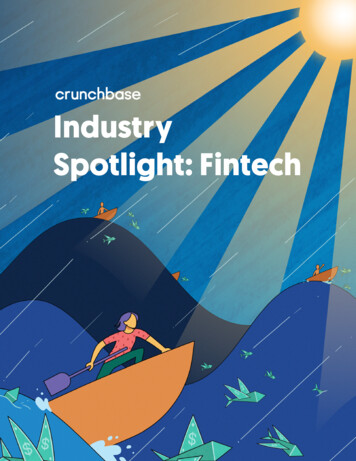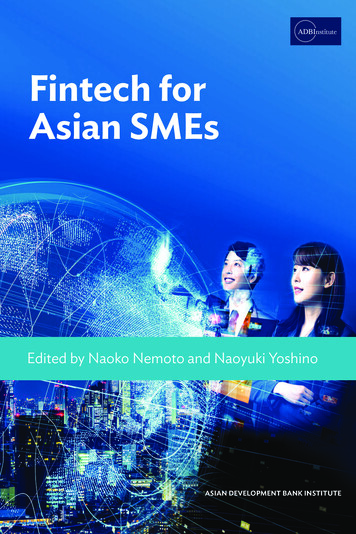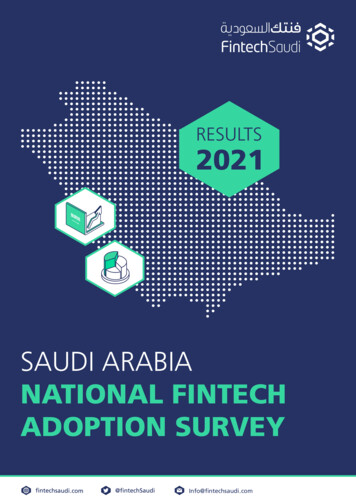
Transcription
DECEMBER 2019MAPPINGMILAN FINTECHL E SSO N S F RO M A DATA S E T O F OV E R 1 1 0 F I N T EC HCO M PA N I E S A N D T H E I R FO U N D E R SI N I TA LY ’S F I N T EC H H U B
THIS RESEARCH WAS MADEPOSSIBLE BY FUNDING FROM
AUTHORS:Lili Török, Project Leader at Endeavor Insight (lili.torok@endeavor.org I @lilitorok)ADDITIONAL CONTRIBUTORS:Gloria Seveso, ESG Manager, Endeavor ItalyArash Gholamzadeh Nasrabadi, Senior Innovation Consultant at Ars et Inventio, BIP Center of ExcellenceABOUT ENDEAVOR INSIGHT:Endeavor Insight is the research division of Endeavor, a non-profit organization that supports high impactentrepreneurs across the world.Its work seeks to answer three questions:1 How do entrepreneurs reach scale at their companies?2 How do entrepreneurs reach scale in local networks or ecosystems?3 What can policymakers, philanthropic leaders, investors, support organizations, and other stakeholders do toempower more entrepreneurs to reach scale in their communities?The methodology utilized in this study builds on previous Endeavor Insightresearch supported by the Bill and Melinda Gates Foundation, the Omidyar Network, the Kauffman Foundation,the Inter-American Development Bank, the Heron Foundation, Foundation, as well as partners in the GlobalEntrepreneurship Research Network.SPECIAL THANKS:The authors of this report would like to thank their colleagues at Endeavor including Rhett Morris, MahaAbdelAzim, Leah D. Barto, Riccardo Broggi, Anna Buchi, Penmai Chongtoua, Luisa Fajardo, Patrick Linton, RaffaeleMauro, Adrián Garcia-Aranyos, and Linda Rottenberg, as well as Pietro Sella, Mico Curatolo, Fintech District,and Bip who provided valuable resources and feedback, including Augusto Fazioli, and Fabio Troiani. The team atSimbiosity contributed important data and comments, especially Filippo Zanetti. A number of research assistantsand analysts were also critical to the project’s success, including Camila Navarrete, and Tanya Kapoor.In addition, the following individuals provided valuable input as Endeavor Insight developed the methodology usedin this project as well as its analyses and content: Christian Miccoli, Elena Lavezzi, Elizabeth Robinson, IgnazioRocco di Torrepadula, Marta Ghiglioni, Pietro Cesati, and Sabino Costanza.
EXECUTIVE SUMMARYIn early 2019, Endeavor Insight partnered with Fintech District and Endeavor Italy to assess the entrepreneurship ecosystem for financial technology companies in Milan. The purpose ofthe study was to provide a snapshot of the sector’s current state, evaluate the industry’s strengths and weaknesses, and enable decision makers to better understand and support localentrepreneurship in the sector. The recommendations in this report are based on 64 interviews with Milan fintech entrepreneurs that Endeavor Insight was able to conduct with supportfrom Bip, as well as additional analysis of 113 local fintech companies. In addition, the team analyzed 159 linkedin profiles of local fintech founders. Fintech companies were defined ascompanies with a technological service or product dedicated to enabling financial services. The study concluded in the following key findings.1Decision makers in the private sector and the public sector alike should focus on3Network Analysis points to challenges and opportunities in the Milan fintech entre-helping companies reaching scale. A historic financial capital in Europe, Milan has seenpreneurship community with long lasting implications for the sector’s future potential.a boom in fintech startup activity in recent years. Just as the banking sector entered a recession, a number of banking professionals, faced with constrained growth opportunitiestween fintech entrepreneurs in Milan. Research shows that mentorships and angel invest-and slashed innovation budgets at their banks, teamed up with technology experts to startment from a founder at scale makes a measurable difference in a founder’s ability to scalenew companies, and over 80 fintech companies were started in Milan in the past five years.and significantly improves their economic performance by number of employees. TheseHowever, only 5 percent of these companies have reached scale and employ more than 50types of connections are extremely uncommon among fintech entrepreneurs in Milan:people today.only 3 percent of companies benefited from this type of support, whereas 58 percent ofMilan’s difficulty to produce fintech companies at scale presents a significant challengecompanies in the sample belong to a network organization like Fintech District, Italiafintech,for the sector’s future growth. In fact, according to European Commission’s data on smallor Endeavor. This could be explained by the fact that the sector is still young. With time,and medium business in Italy, companies with 50 employees or more drive most of thehowever, this may turn into a major challenge in the sector’s ability to foster companies thateconomic growth in the private sector in Italy. Data from previous studies of the technologyscale in the future.sectors of New York, Bangalore, and Mexico City, and other tech hubs around the world show the same trend. Furthermore, companies at scale, on average, tend to pay higheremployment. Fintech companies and the organizations that help them are strongly con-wages than other companies, and they tend to be more resilient in times of crisis. If deci-nected to banks through former employment and investment connections. Over 40 percentsion makers wish to foster growth in the fintech sector, they need to dedicate resources toof fintech founders worked in banking before, and over 30 percent as senior executives. 65addressing the challenges that prevent founders from reaching scale.percent of investors and support organization leaders also come from banking. These con-There is an absence of productive mentorship and angel investment connections be-The fintech community has strong ties with the banking sector because of formernections are important resources for scaling companies: some of the most accomplished2Fintech entrepreneurs identified access to capital, access to talent, and compli-founders in the sector today benefited from business partnerships and equity investmentsance with regulation as their top challenges in scaling their companies today. Based onfrom private banks.interviews with 64 fintech entrepreneurs in Milan, the following are the three major challenges that make it hard to scale a company in the fintech sector today:community and they can become a vehicle to transmit resources. The fintech sector in Milan is characterized by a tight knit web of peer-to-peer connections. EntrepreneursAccess to capital. While many wealthy individuals are involved in early stage invest-Entrepreneurial networks are the most influential actors in the entrepreneurshipments, few venture capital investors, both Italian and international, have expressed interestknow each other well, and they frequently co-operate with each other, often to advocatein fintech companies in Milan. Most local fintech companies’ services are focused on thefor legislative change. As a result, networks and advocacy groups are the most influentialdomestic market, addressing the inefficiencies of the Italian financial ecosystem, such asorganizations in Milan. Because of their enormous influence on the entrepreneurship com-the long time that it takes to pay a vendor, or the cash-heavy nature of consumer finance.munity, networks are important vehicles that transmit experience and resources that mayExit options are extremely limited as well, which makes investors cautious.address the challenges entrepreneurs reported. Access to non-financial talent. There is an abundance of banking talent in Milan, butDecision makers in the public sector and the private sector who wish to supportthere is a shortage of tech skills and managerial skills, and a shortage of people with past4scaleup experience, as reported by interviewed founders. Senior executives and businessfintech entrepreneurship in Milan need to focus on four key areas.development experts are in especially great demand. These needs differed widely by busi- ness model: consumer-facing companies were over 35 percent more likely to rate access toneed to reach scale in Milan for the sector to become productive in the long run. To help themanagers as a challenge compared to business-to-business founders.sector, decision makers should not only focus on supporting startup activity, but also take serious actions to boost companies’ scale up.Compliance requirements. Founders in Milan reported that fintech activity, comparedChannel resources to companies with a potential to scale. More fintech companieswith fellow EU countries, is heavily restricted by regulation, and its lack thereof: the ab- sence of a specific fintech regulatory framework is debilitating as the sector is governed bylead of scaling founders that were able to attract growth capital for their companies. Theythe general traditional financial services rules; this creates uncertainty and high compliancetypically have done so by relying on their personal connections with Italians abroad, or bycosts, while constraining the potential to innovate. 46 percent of the interviewed 64 found-attending an accelerator abroad. Decision makers should actively cultivate connectionsers - and over 60 percent of b2b founders - reported regulation as a major challenge.with high performing accelerators and investment funds abroad and facilitate their entryFoster relationships with international investors. Decision makers need to follow theinto the Italian market. Address the shortage of tech talent and non-financial managerial talent in the sector.Decision makers need to focus their attention on the challenges that hurt growing companies the most. Through international recruitment events and programs to host qualifiedmanagers, decision makers need to foster non-financial talent in Milan. Leverage entrepreneurship networks to foster angel investment and mentorshipamong entrepreneurs in the sector. Entrepreneurship networks are the most influentialorganizations in the Milan fintech community today. Network leaders should use theirprominence to build on the high levels of trust in the system, help entrepreneurs shareresources better, and take over their role as leaders in the community.1
RESEARCH QUESTIONSThe purpose of this study is to identifyhow fintech companies in the Milanmetropolitan area are reaching scale,what are the greatest opportunitiesfintech entrepreneurs can leverage togrow and what are the main scale-upchallenges decision makers can address.Endeavor Insight identified 113 fintechcompanies founded or headquarteredin Milan, collected primary data withsurveys and interviews with the foundersof 64 of them, and secondary datafrom other publically available datasources like Linkedin and Crunchbaseon additional 159 founders.The fintech companies mentioned inthe report are relied to a range of subindustries: tech enablers, crowdfunding,credit, asset management, payments,insurtech, cybersecurity, andcryptocurrencies. 49 percent of the 113companies in the dataset are businessto business (B2B) companies; about 30percent are business to customer (B2C)companies; and the rest are “businessto-business-to-customer” (B2B2C).These latter typically offer solutionstargeting financial advisory businessesor banks, who would then apply themtowards customer-facing solutions.7.8 million people, and a labor forceaccounting about 3.7 million people. Ofthe 3.7 million working population, anestimated 3.2 million are employed in theprivate sector1. “Fintech companies” inthis study are defined as “companies thathave developed or offer a technologicalsolution dedicated to enabling financialservices”, or as “technology companieswhose corporate revenue is mainly linkedto the financial services industry”.Three principal research questionsguided the research process:1.What is the current state ofthe fintech entrepreneurialcommunity in Milan today?2.What is the role of supportorganizations and other institutionsin fostering entrepreneurship andeconomic growth in the sector?3.Where do opportunities exist tofurther the growth of this communityso that it can generate more jobsand wealth for the region?For the purpose of this report, the term“Milan” refers to the greater MilanMetropolitan Area, which includes theprovinces of Milan, Bergamo, Varese,Monza, Como, Pavia, Lecco, and Lodi,an area with a total population of about3
CONTEXTFormer bankerswere well positionedto start fintechcompanies, becausethey were groundedin the inefficienciesof the Italianfinancial marketsand knew which onescould be addressedwith technologicalsolutions.In 1494, the Franciscan friar Luca Paciolipublished a mathematics textbook onarithmetic, geometry, and proportionality,describing for the first time in history anaccounting method called “double entryaccounting,” a technique that Florentinemerchants had long been using to keeptrack of revenues and losses. Withthat, Pacioli documented Europe’s firstfinancial innovation. At the time, thefounders of the Florentine Medici Bankwere just beginning to gain internationalprominence, and by the end of the 15thcentury Central and Northern Italyofficially became the financial center ofthe continent. In the following centuries,nonetheless, a series of invasions fromother prominent European powers stifledthe further development of Italy’s financialindustry, at the advantage of otherfinancial capitals, like London, Brusselsand Amsterdam, that managed to quicklygain control of international trade routes.Things began to change after theNapoleonic era, when Italy benefited fromthe introduction of a series of scientificand cultural innovations coming fromthe French Enlightenment, such as theintroduction of structured local creditmarkets, the creation of notary law andforeclosure law and so on. Since then,Northern Italy as a whole - and particularlyMilan - began reigniting their relativecentrality in financial terms, a processthat was that was funneled after the4Unification of Italy. The nascent kingdomof Italy devoted growing investmentsin the industrial development of thecountry: this process coincided with therise of the first private banks, such asBanca Sella, founded in 1886 in Biella.After the two World Wars, the war-torncountry managed to start a spectacularseason of economic renaissance, whichlasted until the end of the century andwas catalysed by the contribution of anetwork of solid financial actors, likeMediobanca and Intesa Sanpaolo.Northern Italy was able to capture thisnew type of economic development,making the country the second industrialpower in Europe and of Milan theunmatched business capital of Italy.Since then, Northern Italy has remained aprominent financial center in Europe. Overtime, Milan gained prominence as Italy’sfinancial capital, and today, it headquartersUnicredit and a significant portion of IntesaSanpaolo’s activities, two of Europe’sbiggest banks, about 170 smaller banks,and the Borsa Italiana. 2 A number offoreign financial institutions establishedheadquarters in the Porta Nuova district:AXA, Bank of America, BNP Paribas, ChinaConstruction Bank, HSBC, and Accenture,among others. In total, there are anestimated 70,000 people employed in thefinancial services sector in Milan today. 3
NUMBER OF NEW FINTECH COMPANIES FOUNDED BY YEARThe past five years have seen an upsurge in new business activity in the fintech industry in 012201320142015201620172018Source: Endeavor Insight. Sample size 113 entrepreneurial financial technology companies founded in Milan.In Times of Crisis, anOpportunity for FintechBeing a city of 70,000 financial experts,Milan has been a relative latecomer tofintech. Up until the mid-2010s, there wereonly around 40 fintech companies in Milan,while the fintech ecosystems of Londonand Dublin were already flourishing,with companies like Transferwise andStripe gaining traction across the world.In the aftermath of the Eurozone financialcrisis, Italy entered a prolonged recession.4Most banks slashed their innovationbudgets, and a frustrated workforce wasretained with hardly any salary increasesor bonuses in sight. In 2016, PSD2, aEuropean directive on payments clarifiedregulation around online paymentscompanies in the E.U. Fintech companieswere now allowed to make paymentson a consumer’s behalf without beingregistered and regulated as a bank. 5The banking crisis, coupled with thechanges in regulation, were enough toconvince many banking experts to spinoff from their banks and start their owncompany. 6 Over 80 fintech companieswere founded between 2014 and 2019,and the sector tripled in size. Formerbankers were well positioned to startfintech companies, because they weregrounded in the inefficiencies of the Italianfinancial markets and knew which onescould be addressed with technologicalsolutions. In 2019, Endeavor Insightidentified 113 fintech companies foundedor headquartered in the area, whoemployed over 1,400 people overall.5
Italy is a country of4.3 million smallbusinesses, andmost of thesebusinesses haveconstant cashflow problems.6Unique Opportunities in the ItalianEconomy: SMEs, Payments, and PrivateWealthBecause of their ties with the financialsector, fintech founders were well versedin the market opportunities available in theSmall and Medium Enterprises (SMEs)space, counting 4.3 million businesses inItaly, among which 4.1 millions are small(i.e. below 10 employees) 7. Several SMEshave cash flow problems linked withpayment time, which, according to officialgovernment data, range between 70 and80 days. 8 Experts interviewed for thisstudy typically quoted a timeframe longerthan 90 days, especially when workingwith the Public Administration. Witharound 180 billion bank loans and bondsfunding mostly reserved to medium-sizecompanies, small and micro companiesshow stagnant growth in financing andappear to be largely underserved bytraditional financial institutions. 9In this inconvenience, fintech companyfounders were quick to recognize theopportunity to facilitate the waiting periodwith online factoring services. 10 Otherstapped into the opportunity to convertItalian customers to credit cards. 85percent of point of sale operations stilltake place in cash in Italy, but the rate ofadoption for other payment methods likecredit cards and e-wallets is growing twiceas fast as the European average.11
Milan has another important asset thatallowed its fintech industry to flourish. Italyhas one of the highest amounts of privatewealth in the world, and high net worthindividuals are becoming an importantcustomer segment for the fintech sector.These customers are conservative intheir financial habits, and rarely interactdirectly with fintech solutions. 12 Instead,their bankers and financial advisors do,and a number of fintech solutions aretargeting these advisors as a customerbase, complementing advisory serviceswith machine learning solutions. 13Founders perceive Milan as a validalternative to other fintech hubs bothwithin Italy and Europe. Comparedwith other Italian cities, doing businessin Milan has some unique advantagesas it is recognized as Italy’s financialcapital, providing extensive businessopportunities for fintech companies.Further, Milan-based companies have anecosystem advantage due to proximitywith most of Italian large corporates andinvestors. Compared with other Europeancities, Milan has a vivid internationaland entrepreneurial ecosystem and acompetitive advantage in terms of costof doing business, talent and qualityof life. Interviewed founders showed acommitment to Milan: more than 75percent mentioned that they plannedto continue living in the city either forlonger than three years, or indefinitely.having the right connections. Nearly ahundred percent of respondents believedthat ambition and hard work impactone’s chances of getting ahead, whereasless than 20 percent believed that nonmeritocratic factors like race, nationality,or class mattered. It is important tomention here that respondents mayhave been biased towards their personalperspective: in a community where lessthan 10 percent of entrepreneurs arewomen, it is perhaps not surprising thatless than 10 percent believe that genderis irrelevant on the road to success.Fintech founders also perceive Milan as ameritocratic community, where qualitieslike hard work, ambition and creativity arevalued significantly more in the industrythan coming from the right family orPERCEPTIONS OF MERITOCRACY AMONG FINTECH FOUNDERS IN MILANPercent of founders who believed the following factors were very important or essential to being asuccessful fintech entrepreneur in ss tocheatRaceComing froma wealthyfamilyKnowing theright peopleAmbitionHard workSource: Endeavor Insight. Sample size 64 fintech founders in Milan interviewed for the study.7
NOT ALL FIRMS CONTRIBUTED EQUALLY TO THE GROWTH OF THE MILAN FINTECH COMMUNITY.Wealth and asset management, insuretech, and payments companies outperformed their peers by their share ofemployment relative to their number.SHARE OF EMPLOYMENT AMONG MILAN FINTECH FIRMSSHARE OF FIRMS REPRESENTED BY SUB-INDUSTRY25%20%15%10%5%0%Tech enablerWealth and assetmanagementCreditInsuretechPaymentsSource: Endeavor Insight. Sample size 113 entrepreneurial financial technology companies founded in Milan between 1995 and 2019.8CrowdfundingCybersecurity
SCALE AND DYNAMISM:ARE FINTECH COMPANIES SCALING IN MILAN?While the number of new startups hasexploded in Milan for the past decade,entrepreneurs are facing significantconstraints in scaling their companiesover a certain level. Among the estimated113 fintech companies in the sectortoday, only 5 percent employ morethan 50 people, and none of them werefounded in the past 5 years. The largestfintech companies like Moneyfarm andSatispay employ slightly more than 100employees. Successful fintech companiesfounded around the same time like N26 inGermany, Revolut in the UK, or Nubank inBrazil employ an order of magnitude more.Further, there were only six acquisitions inthe sector to date. Fintech companies arestarting up, but they are not scaling.Milan’s difficulty to produce fintechcompanies at scale poses significantchallenges for the sector’s future growth,because companies that scale drive mostof the economic growth in a country.Companies with 50 or more employeesacross all sectors represent less than 1percent of Italian businesses in the privatesector (all sectors), but they account fora third of the job creation and over halfof the revenue generation in the privatesector. 14Other studies of tech entrepreneurshipconducted by Endeavor Insight showsimilar trends in New York, Bangalore andMexico City. Research from across theworld has demonstrated that companiesat scale also tend to pay higher thanaverage wages, and they are more resilientin times of crisis. 15What makes it so hard to scale a fintechcompany in Milan today? Decision makerswho want to help the fintech sectorgrow need to identify and address theseconstraints. Fintech entrepreneurs whoare working to scale their companiestoday are the best source of thisinformation, and when asked about whatwere their greatest challenges in scalinga company, they pointed out three issueareas.Among theestimated 113 fintechcompanies in thesector today, only5 percent employmore than 50people, and none ofthem were foundedin the past 5 years.9
ECONOMIC CONTRIBUTION AMONG ITALIAN COMPANIES IN THE PRIVATE SECTOR BY COMPANY SIZELess than 1 percent of companies have 50 or more employees in Italy, but they account for over 30 percent ofthe jobs and over half of the revenue created by Italian companies in the private sector.COMPANIES WITH 0-49 EMPLOYEESCOMPANIES WITH 50 OR MORE EMPLOYEES100%75%50%25%0%% CompaniesSource: European Commission Factsheet on Small and Medium Enterprises, 2017.10% Job Creation% Revenue
CHALLENGES: WHAT ARE THE GREATEST CHALLENGES THATPREVENT FINTECH ENTREPRENEURS FROM SCALING IN MILAN?CHALLENGE 1ACCESS TO CAPITAL.Access to capital was one of thehighest rated challenges amonginterviewed entrepreneurs: almosthalf of the interviewed founders ratedaccess to financial capital either asa major obstacle or a very severeobstacle. Interviewed entrepreneursmentioned the following reasons.1.Banks rarely make equity investmentsin the fintech sector. Equity investmentsand acquisitions in the fintech sector wereuncommon among both banks and theircorporate investment arms, even of theones with the largest innovation budgets.This resistance to equity investmentscould be linked to corporate culture andorganizational complexity. Further, suchdeals might not be attractive to foundersdue to valuation and potential operationallimits in collaborating with other banks.122.For many international investors,Italian fintech companies are overlyfocused on solving Italian problems.Italian investors interviewed for this studyexplained that international investorscould provide additional growth capitalfor fintech entrepreneurs, but they actcautiously because they are unfamiliarwith Italian financial consumer habits andthe inefficiencies of financial markets thatmost fintech companies are addressing.Before they would invest in Italian fintechcompanies, they look for previousinvestment activity on behalf of domesticinvestors, but domestic investorshave rarely invested in the sector.3. The prospects of having a profitableexit are uncertain. One of the maindrivers of venture capital investors is thelikelihood of an exit. Fintech in Milan doesnot have a history of successful exits, withonly six known cases of full acquisitions,of which only Neutrino, a cybersecuritycompany, sold for over USD 10 million toSan Francisco-based Coinbase.16 As Italianbanks have a limited appetite for startupacquisitions, exits would be more likelyto happen on the international market.However, as most fintech initiativesfocus on solving problems that arespecific to Italian markets, the appeal forinternational players is limited as well.
CHALLENGE 2ACCESS TO NON-FINANCIAL TALENTAccess to talent ranked similarly highamong the challenges that foundersmentioned.1. Non-financial talent and seniorexecutive positions are hard to fill infintech. There are about 70,000 financialservices professionals working in Milan,but interviewees reported that other typesof talent are hard to find. When askedabout the hardest positions to hire for,over 70 percent of respondents broughtup non-finance related positions, with themost prominent hiring issues related tomarketing and data science. High-growthentrepreneurs particularly struggledto find the right senior executives orbusiness development experts: about 40percent of them brought this problem up.2. Milan founders are competing fortalent with tech companies acrossEurope. With a fluid workforce willingto move abroad (28,000 graduatesleft the country in 2017 alone), Italiancompanies have to compete for talentwith tech companies all across Europe.When fintech founders are trying to scalein Milan, the companies they competewith for tech talent and managerial talentare success stories like Cabify and Glovoand American tech companies like Uber,Netflix, and Tesla which establishedEuropean headquarters in Amsterdam. 17These types of challenges vary widelyby business model, as illustrated by thechart on the following page: consumerfacing companies were over 30 percentmore likely to report challenges relatedto hiring qualified managers as othercompanies than others, while businessto-business founders were more likelyto struggle with regulatory challenges-Companies with sufficient budget havechances to win this game and some areeven succeeding in targeting the formeremployees of other European companies.13
CHALLENGE 3REGULATIONWhile consumer protection andregulatory measures known as “KnowYour Customer” and anti -moneylaundering measures are a commonconstraint on fintech companies allaround the world, Italian companieshave to navigate a particularlycomplicated supervisory landscape.This complexity results partly from thecombination of national legislation andEU-mandated directives that need tobe interpreted and applied. This is thecase across all 28 EU member states,but it may impact the Italian fintechecosystem even more severely.The fintech regulatory framework inItaly does not separate new playersfrom established institutional ones. Asa result, Italian companies operate in ageneral atmosphere of uncertainty whichtranslates into high operational costs.The conspicuous absence of legislationmeans that fintech players fall withinthe jurisdiction of several existingfinancial services regulatory bodiessuch as the European Securities andMarkets Authority, Bank of Italy andConsob, and this translates into highcompliance costs for fintech companies.More than a safety measure, these costsare inevitable to obtain and maintainthe authorization from regulators.As soon as a directive on payments orlending is adopted in the EU, the ItalianCentral Bank needs to get to work totranslate it into Italian legislation, andcommunicate the coming changes.When a new European directive isadopted, Italian legislators need timeto ratify it. This causes an atmosphereof uncertainty where Italian fintechcompanies sometimes spendmonths developing technology thatmay not comply with the cominglegislation. Companies need to retainlarge compliance teams becauseBanca d’Italia needs to authorize theorganization structure for companiesin the financial services and that needsto involve a compliance team. Onefounder reported that in his first year ofoperations, there were three complianceofficers on his 17-people team. 18THE HIGHEST RATED CHALLENGES OF FINTECH FOUNDERS IN MILAN BY BUSINESS MODEL TYPEPercent of respondents who rated the following issues as a “se
2 Fintech entrepreneurs identified access to capital, access to talent, and compli-ance with regulation as their top challenges in scaling their companies today. Based on interviews with 64 fintech entrepreneurs in Milan, the following are the three major challenges that make it hard to scal

